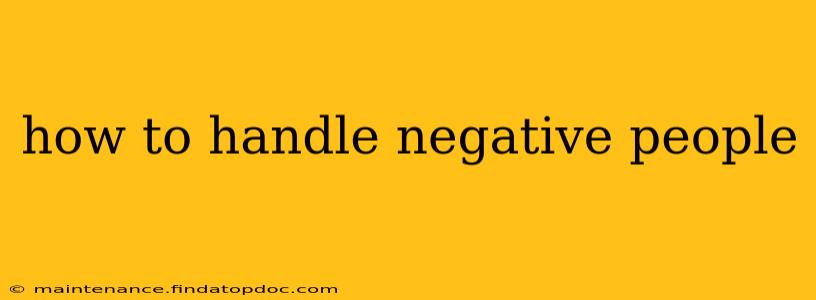Negative people can drain your energy and impact your mental health. Whether it's a coworker, family member, or friend, learning how to effectively navigate these relationships is crucial for your well-being. This guide provides practical strategies to help you handle negative people with grace and protect your own emotional stability.
What Defines a Negative Person?
Before we delve into strategies, it's important to understand what constitutes negativity. A negative person isn't simply someone who sometimes expresses dissatisfaction. Instead, they consistently exhibit behaviors like:
- Constant complaining: Their conversations are overwhelmingly focused on problems without offering solutions.
- Pessimism and cynicism: They anticipate the worst-case scenario and rarely see the positive in any situation.
- Criticism and judgment: They frequently criticize others and find fault in everything.
- Drama and manipulation: They create or exaggerate problems to garner attention or sympathy.
- Lack of accountability: They avoid taking responsibility for their actions and blame others.
- Energy draining: Spending time with them leaves you feeling exhausted and depleted.
Recognizing these traits is the first step in effectively managing your interactions.
How to Deal with Negativity: Practical Strategies
1. Limit Your Exposure: This is often the most effective strategy. You don't have to completely cut them out of your life, but reducing the frequency and duration of your interactions can significantly lessen their negative impact. This might mean declining invitations, shortening phone calls, or simply being less available.
2. Set Boundaries: Clearly communicate your limits. This could involve saying things like, "I'm not comfortable discussing this topic," or "I need to take a break from this conversation." Don't feel guilty about protecting your mental space.
3. Practice Active Listening (with caveats): While active listening is generally a positive communication skill, with negative people, it's crucial to set limits. Listen empathetically, but don't get sucked into their negativity. Focus on understanding their perspective without internalizing their negativity. Avoid offering unsolicited advice unless they specifically ask for it.
4. Don't Engage in Arguments: Arguments rarely change a negative person's behavior. They often escalate the negativity. Instead, disengage politely and redirect the conversation to a more positive topic, or simply excuse yourself from the interaction.
5. Focus on Solutions (if appropriate): If the situation allows, and you feel comfortable doing so, gently guide the conversation towards finding solutions. Frame your suggestions constructively and avoid judgmental language.
6. Practice Self-Care: Protecting your mental well-being is paramount. Engage in activities that help you de-stress and recharge, such as exercise, meditation, spending time in nature, or pursuing hobbies.
7. Seek Support: Talking to a trusted friend, family member, or therapist can provide valuable support and perspective. Sharing your experiences can help you process your emotions and develop coping strategies.
Frequently Asked Questions (FAQs)
How do I deal with a negative coworker?
Dealing with a negative coworker requires a more professional approach. Prioritize documenting their behavior, communicating your concerns to HR or your supervisor if necessary, and focusing on your own productivity and well-being. Limit your interactions outside of work-related tasks.
What if the negative person is a family member?
Family relationships are complex. While limiting exposure might be difficult, setting boundaries is still crucial. Communicate your limits clearly and firmly. Consider family therapy if the situation allows and you feel it could be beneficial.
Is it okay to just cut off contact with a negative person?
Yes, it's perfectly acceptable to distance yourself from someone who consistently brings negativity into your life. Prioritizing your mental health is essential. Cutting off contact might be the healthiest option in some situations.
How can I tell if I'm becoming a negative person myself?
Reflect on your own thoughts, feelings, and behaviors. Do you frequently complain? Are you pessimistic? Do you find yourself criticizing others excessively? If so, consider seeking professional help or engaging in self-reflection exercises to identify and change negative patterns.
By implementing these strategies and prioritizing your well-being, you can effectively navigate relationships with negative people and maintain your own emotional equilibrium. Remember, you have the right to protect yourself from negativity.
